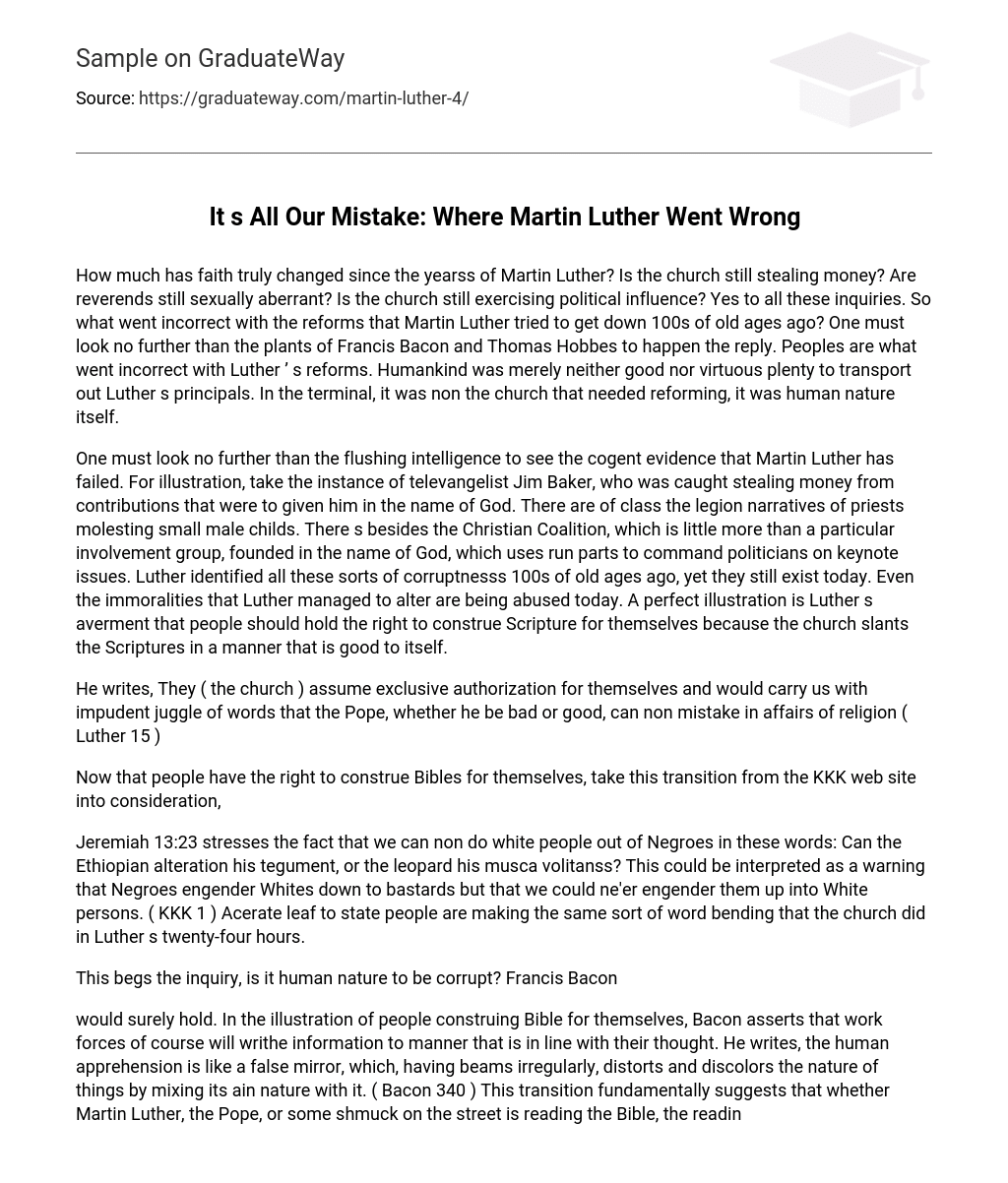How much has faith truly changed since the yearss of Martin Luther? Is the church still stealing money? Are reverends still sexually aberrant? Is the church still exercising political influence? Yes to all these inquiries. So what went incorrect with the reforms that Martin Luther tried to get down 100s of old ages ago? One must look no further than the plants of Francis Bacon and Thomas Hobbes to happen the reply. Peoples are what went incorrect with Luther ’ s reforms. Humankind was merely neither good nor virtuous plenty to transport out Luther s principals. In the terminal, it was non the church that needed reforming, it was human nature itself.
One must look no further than the flushing intelligence to see the cogent evidence that Martin Luther has failed. For illustration, take the instance of televangelist Jim Baker, who was caught stealing money from contributions that were to given him in the name of God. There are of class the legion narratives of priests molesting small male childs. There s besides the Christian Coalition, which is little more than a particular involvement group, founded in the name of God, which uses run parts to command politicians on keynote issues. Luther identified all these sorts of corruptnesss 100s of old ages ago, yet they still exist today. Even the immoralities that Luther managed to alter are being abused today. A perfect illustration is Luther s averment that people should hold the right to construe Scripture for themselves because the church slants the Scriptures in a manner that is good to itself.
He writes, They ( the church ) assume exclusive authorization for themselves and would carry us with impudent juggle of words that the Pope, whether he be bad or good, can non mistake in affairs of religion ( Luther 15 ) Now that people have the right to construe Bibles for themselves, take this transition from the KKK web site into consideration, Jeremiah 13:23 stresses the fact that we can non do white people out of Negroes in these words: Can the Ethiopian alteration his tegument, or the leopard his musca volitanss? This could be interpreted as a warning that Negroes engender Whites down to bastards but that we could ne’er engender them up into White persons. ( KKK 1 ) Acerate leaf to state people are making the same sort of word bending that the church did in Luther s twenty-four hours. This begs the inquiry, is it human nature to be corrupt? Francis Bacon would surely hold. In the illustration of people construing Bible for themselves, Bacon asserts that work forces of course will writhe information to manner that is in line with their thought. He writes, the human apprehension is like a false mirror, which, having beams irregularly, distorts and discolors the nature of things by mixing its ain nature with it. ( Bacon 340 ) This transition fundamentally suggests that whether Martin Luther, the Pope, or some shmuck on the street is reading the Bible, the readings that will originate are traveling to be in harmoniousness with how each of those three persons think.
Bacon goes on to compose, everyone has a cave or lair of his ain, which refracts and discolors the visible radiation of nature. ( Bacon 340 ) Martin Luther accused the Church of edifice three walls around themselves and of concealing behind the power of the pontificate ( Luther 15 ) ? The charge Luther made was merely a merchandise of people being people. In fact, did Luther himself hid in his ain cave, keeping up faith as his protection. Thomas Hobbes paints an even poorer image of human nature that explained more of Luther s charges against the church. Luther was appalled by the pattern of indulgences, the trading of money for absolution of wickedness. He felt that it was a greedy and immoral thing to make. However Hobbes would term that pattern as the portion of human nature that he called Competition. He wrote that it maketh work forces occupy for Gain and that it pushes work forces to do themselves Masterss of other work forces s individuals, married womans, kids, and Cattell ( Hobbes 22 ) Equally far as Thomas Hobbes is concerned, it is merely human nature to be avaricious, and if this is so the church couldn T truly be blamed for it.





